

Africa's growing middle class splash out on their locks. Governments push for more home-grown industrial solutions. Why Ethiopia is on track to become Africa's industrial powerhouse. Ethiopia seems to be attracting the attention of economists interested in Africa, and for good reason.
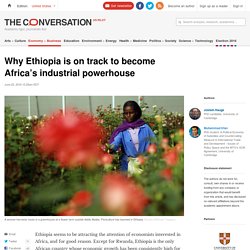
Except for Rwanda, Ethiopia is the only African country whose economic growth has been consistently high for more than a decade without relying on a natural resource boom. Between 2004 and 2014, per capita growth in Ethiopia was 8% per year. This was the highest on the continent during this period, and is impressive by any standard. The growth has been attributed mainly to a construction boom and increased agricultural productivity. But manufacturing has also been vital. Nevertheless, manufacturing as a share of gross domestic product in Ethiopia remains 5%, well below the African average of 10%. Despite this, it’s not a long-shot to predict that Ethiopia will catch up with countries like China and Vietnam in some low-tech manufacturing industries in the near future. The developmental state First is the country’s developmental orientation. Nigeria, Kenya and Ethiopia could rival SA’s motor industry.
HARMONISED regional trade policies and comprehensive national investment strategies could create at least three rivals to SA’s domination of the vehicle-manufacturing industry in sub-Saharan Africa, says a new report.
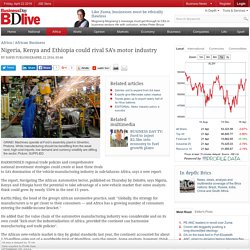
The report, Navigating The African Automotive Sector, published on Thursday by Deloitte, says Nigeria, Kenya and Ethiopia have the potential to take advantage of a new-vehicle market that some analysts think could grow by nearly 550% in the next 15 years. Karthi Pillay, the head of the group’s African automotive practice, said: "Globally, the strategy for manufacturers is to get closer to their consumers — and Africa has a growing number of consumers entering the middle-income bracket. " He added that the value chain of the automotive manufacturing industry was considerable and on its own could "kick-start the industrialisation of Africa, provided the continent can harmonise manufacturing and trade policies". The arguments for Nigeria having its own industry are inescapable. Automobiles: l’Afrique tente d’imposer ses propres marques. Stratégie : comment les entreprises africaines montent en puissance face aux multinationales.
Les champions nationaux gagnent de plus en plus de parts de marché sur le continent… au détriment des multinationales.

Africa: Who Are the Other Carmakers in Africa? OpinionBy James Ssekandi The African continent tends to be content on selling its raw materials and produces less than one per cent of the world's manufactured goods.

And when it comes to car manufacturing, the industry is almost non-existent on the continent. However, car manufacturers in some countries are taking some steps, if feeble ones, towards significantly contributing to the growth of the industry on a continent that is billed by some economists to turn into the world's economic powerhouse by the turn of the century. In Uganda, last December saw Kiira Motors Corporation (KMC) launch a business strategy meant to establish capacity to manufacture vehicles in Uganda with production expected to start in 2018 through assembling.
The Kiira Smack is one of the vehicles built by former Makerere University students who are currently employed by KMC. Africa maintains pace as fastest growing beer market. Africa is predicted to achieve an average growth rate of 5% from 2015 to 2020, ahead of Asia which is expected to grow at an average rate of 3% during the same period.
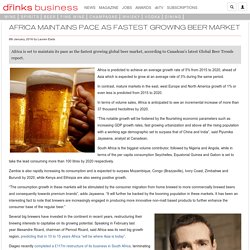
In contrast, mature markets in the east, west Europe and North America growth of 1% or even less is predicted from 2015 to 2020. In terms of volume sales, Africa is anticipated to see an incremental increase of more than 37 thousand hectolitres by 2020. “This notable growth will be fostered by the flourishing economic parameters such as increasing GDP growth rates, fast growing urbanization and above all the rising population with a working age demographic set to surpass that of China and India”, said Piyumika Jayasena, analyst at Canadean.
South Africa is the biggest volume contributor, followed by Nigeria and Angola, while in terms of the per capita consumption Seychelles, Equatorial Guinea and Gabon is set to take the lead consuming more than 100 litres by 2020 respectively. Africa: The Place Automakers Need to Go After. Source: YouTube/CCTV Africa It may be a bit of a long shot, but African countries like Nigeria could be the final frontier for any automakers looking to cash in on the benefits of globalization and the financial fortitude of emerging markets.

Long considered a lost cause due to prolific amounts of poverty, Africans in certain countries have amassed enough wealth that car manufacturers are actually starting to consider the continent’s legitimacy as a contender for future growth. Sure, Nigeria had a pretty big misstep a couple years back when it first unveiled a slew of incentives designed to attract carmakers but couldn’t deliver on the promised provisions, but at least 36 automakers now have production licenses drawn up in the continent’s biggest economy. Les 25 pionniers de l'agroalimentaire en Afrique francophone. Du Maroc au Sénégal, de la RD Congo à la Côte d'Ivoire, ces entrepreneurs sont les 25 pionniers de l'agroalimentaires en Afrique francophone. © Olivier/JA, Bruno Lévy/JA, Sylvain Cherkaoui/JA, Vincent Fournier/JA À la tête de multinationales ou de PME, ces 25 pionniers sont des précurseurs de l'industrialisation des filières agricoles africaines.

News - Purdue gets funding for commercializing PICS bags in Africa. June 3, 2014 WEST LAFAYETTE, Ind. - Purdue University is receiving a $10 million grant from the Bill & Melinda Gates Foundation to develop a program that will put the crop-saving PICS bags into the hands of more farmers in Sub-Saharan Africa countries to improve their food security and income.
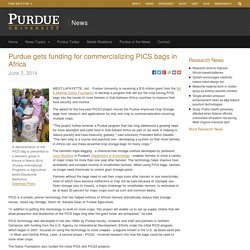
The award for the five-year PICS3 project moves the Purdue Improved Crop Storage bags from research and applications for only one crop to commercialization involving multiple crops. "This project further extends a Purdue program that has long addressed a growing need for more abundant and safer food in Sub-Sahara Africa as part of our work in helping to reduce poverty and food insecurity globally," said university President Mitch Daniels. "The next step is a crucial and practical one - developing a system so that more farmers in Africa can use these essential crop storage bags for many crops. " The Gates Foundation also funded the initial PICS and PICS2 projects. Africa's ever-changing lifestyle...rise of snooty wine experts, tech snobs and the beautiful people. IN November, the Kenya-headquartered regional beverages giant East African Breweries Limited (EABL) launched an online drinks portal, allowing consumers to have their orders home-delivered.

The menu offering is an eclectic mix, ranging from single malts and blended scotch whiskies to beers, rums and liqueurs. In media interviews, a spokesman termed the uptake as robust, suggesting they had benefited from a holiday bump. If it takes hold, and there is no reason to suspect that it will not, it would be a welcome boost to the firm’s flatlining revenue by focusing more on spirits. It is a shrewd move: the portal in many ways is a microcosm of Africa’s changing lifestyle trends. EABL, majority held by the UK’s Diageo, is not your average African brewer: in its full year financial results reported in August, it turned in a gross profit of $335 million, at current rates. How Africa Can Stake A Claim On The $280B Global Luxury Industry. Afrique/Le continent en voie d’être le deuxième marché au monde d’ici 2017. Business - Why Africa is on cusp of consumer boom. Africa could benefit from an economic boom owing to potential entry of foreign investors looking to pump billions of dollars into the technology and manufacturing sectors.
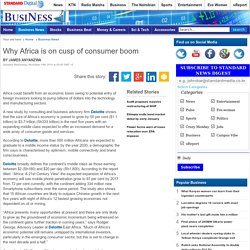
A new study by consulting and business advisory firm Deloitte shows that the size of Africa’s economy is poised to grow by 50 per cent ($1.1 trillion) to $3.7 trillion (Sh333 trillion) in the next five years with an expanding middle class expected to offer an increased demand for a wide array of consumer goods and services. According to Deloitte, more than 500 million Africans are expected to graduate to a middle income status by the year 2030, a demographic the firm says is characterised by optimism, mobile connectivity and brand consciousness. Deloitte broadly defines the continent’s middle class as those earning between $2 (Sh180) and $20 per day (Sh1,800). Africa - Digital manufacturing. Africa could potentially skip the second industrial revolution – traditional manufacturing – and leapfrog straight into digital manufacturing (or 3D printing as it is commonly known).
Last year a young entrepreneur and inventor from the small West African nation of Togo made history by creating the first ever 3D printer assembled from e-waste. At a scrap yard in Lomé, Togo’s capital, Kodjo Afate Gnikou spent weeks foraging for leftover computer, scanner and engine parts to construct his DIY 3D-printing machine. Costing just $100 to build, this innovative machine can be used to manufacture simple plastic objects such as food containers and other household wares, while also tackling the growing problem of e-waste. This is merely one example of the ever increasing level of technological innovation happening on the continent. Sub-Saharan Africa Manufacturing: Where To Build A Factory? VENTURES AFRICA – Sub-Saharan Africa is ‘on the rise’. There are growing GDPs and an emerging middle class. Sub-Saharan Africans are buying more and exciting investors in the consumer good space from all corners of the globe.
Manufacturing accordingly is a ‘buzz’ word as investors imagine local producing machines that could satisfy a growing market at home and an always consuming market abroad. D’ici la fin du siècle, 40 % de la population mondiale vivra en Afrique. Consumer goods: Companies in Africa find that nice things come in smaller packages. Africa’s move to process more cashews may hit Indian industry. Africa’s move to process more cashews may hit Indian industry Leading African cashew producers’ move to process more nuts at the place of origin could harm the Indian cashew nut industry, which imports more than 50% of its requirement of raw nuts.
Poor productivity of Indian cashew plantations is one of the major reasons behind the cashew nut processing sector performing at below capacity despite the enormous skill advantage. India produces 6-7 million tonne of raw cashews per annum and processes nearly 60% of the kernels consumed globally. Retail sector and the African continent. The impact of retail business in Nigeria cannot be overemphasised, considering it has remained a major driver of the economy as is the case anywhere in the world. According to A.T. Kearney’s first African Retail Development Index rankings, globally, retail trade accounts for 27 percent of the world’s Gross Domestic Product (GDP), recording about $19 trillion of retail sales annually. The retail sector also employs 17 percent of the global workforce, which is about 800 million people in the United States of America alone, as one in every 10 people works in the retail sector.
Now, Nigeria is a retailer’s delight, with a population of over 170 million people (the seventh largest in the world); consumer spending well in excess of $100 billion a year, and a fast growing middle-class. With Nigeria being the most promising market on the African continent, over 80 million Nigerians live in metropolitan areas, creating huge opportunities for formal retail to thrive. According to A.T. Nine ways women are changing African markets. The African female consumer has long been mischaracterised and overlooked by marketers across the continent. But now, with women continuing to emerge as powerful decision-makers and consumers - they are changing the face of the African market. Instant Grass creates relationships between businesses and people. It has an ongoing dialogue with our grass communities across Africa, using a range of communication tools. The following report is a compilation of opinions from those grasses on the ground. **Where applicable data and sources have been included. #1: The main market.
Top Five Food Markets In Sub-Saharan Africa. VENTURES AFRICA – They were lost in Luanda, Angola bustling capital, until they found the McDonalds. Being American in a familiar place in a foreign country is home until you see the price for the burger meal: $14. This being Africa means there must be a local twist, says the American tourist John, and sometimes the twist is the price. Investing in the sub-Saharan African market is the right move at the right time. With West Flat, Big Brewers - WSJ. NS Grande Distribution.pdf. Brewing a beer revolution in Africa. 18 August 2014Last updated at 19:11 ET By Roderick Macleod Africa Business Report Oscar Olsen, the "beer hunter", says he wants to bring a beer revolution to Africa Beer may be big business in Africa, but it is a sector dominated by multinationals and Oscar Olsen is taking them on.
Hailing from the pint-sized island of Mauritius, Mr Olsen, much like the ales and lagers he brews, is not what you would expect. For someone who calls himself a professional "beer hunter" he is surprisingly slim and fit. He is also one of those rare people who has managed to turn a genuine passion into a thriving business. Dangote To Produce 29m Tonnes Of Cement By Sept.
The chairman of Dangote Group of Companies, Alhaji Aliko Dangote, has said that his cement company would by September this year, be producing 29 million tonnes of cement to meet the demand of the generality of buyers. “Nobody will experience any shortage of cement supply in the country, even in the dry season,” said Dangote. He made this known during a customer forum session with the cement dealers from the northern part of the company, held at Grand Central Hotel, Kano.Dangote also promised that his cement was going to be the best in Africa. L’incroyable marché de l’automobile de luxe en Afrique. Tour d’horizon des tablettes numériques « made in Africa » Phone chargers for Africa and 3D-printing in space win Branson backing. Solar-powered phone chargers for the developing world, 3D-printed satellites and bespoke shoes for the rest of us have won the chance to stroke the beard of multimillionaire lion-impersonator Sir Richard Branson. The startups were named as 'Three New Things' worthy of support from Virgin Media Business, chosen by a panel of big brains including quantum computing and nanotechnology expert Dr Ling Ge, the Government's Technology Strategy Board's Emily Memarzia, and technology commentator Monty Munford.
The most worthy of the three new things is Buffalo Grid, which gives large solar-powered phone-charging stations to people who live out of reach of power in Africa and the developing world. Prototype units were launched in Uganda, where Buffalo Grid says 80 per cent of people have access to a phone but only 5 per cent have access to power. People can unlock the chargers by text and juice up their phones to keep in touch with friends and family and the rest of the world. Smartphones and Emerging Markets: Making the Mobile Revolution Sustainable. When the first mobile phone reached consumers in the early 1980s, it weighed 2.5 pounds and cost just under $4,000. Africa’s New Consumers Choose Quality Over Quantity - Frontier Markets News - Emerging & Growth Markets.
Le boom du commerce de détail en Afrique subsaharienne. En septembre 2011, les cabinets Deloitte et Planel Retail dévoilaient les résultats d'une étude sur le commerce international de détail qui mettait alors en évidence, l'attractivité des marchés algérien, kényan, ou encore sud-africain. Deux ans et demi plus tard, le cabinet de conseil en stratégie A.T Kearney publie une nouvelle étude sur cette même thématique et révèle que les pays de l'Afrique subsaharienne constituent aujourd'hui des marchés à fort potentiel. Conseiller les détaillants structurés afin d’intégrer efficacement le secteur de la vente au détail, tel est l’objectif de cette étude qui a la particularité d’avoir donné naissance au premier indice de développement du commerce de détail en Afrique subsaharienne intitulé ARDI (African Retail Développement Index).
Food Business Africa. Analysis: African growth offers wide opportunity to consumer goods firms. Fast-moving consumer goods in Africa - FMCG : Bolloré Africa Logistics. Technology Trends Nigeria-ICT Development in Nigeria. Africa Business Market - Les petites entreprises, facteurs de croissance économique. Transportation content from IndustryWeek. African manufacturers are taking advantage of international interest
Emerging retail patterns in Africa. Opportunities in the sports TV sector in Africa. From phones to fashion to rice: Online shopping gaining traction in Africa. Priority Consumer Markets for FMCGs (Horizon 2020) by Country. Manufacturing in Africa: An awakening giant. 7 Innovative Products From Africa You Should Know. Vietnam : Vietnam, Burkina Faso sign MoU on trade cooperation - Textile News Vietnam. INSIGHT: Luxury cars now flooding African cities - Magazines - thecitizen.co.tz. Creating an African luxury industry.
Online shopping ‘vital to African boom’ Challenges of Online Retail in Africa - AfriqueITNews.com - Fresh news about technology and startups from Africa. $50 Android Smartphones Are Disrupting Africa Much Faster Than You Think, Says Wikipedia’s Jimmy Wales. Supermarket sweepstakes: Africa's small farmers encounter the modern grocery store. Synthesis_report_FINAL - la-mkt-synthesis.pdf. Selling to Africa's 'next million' shoppers. African consumers 'underestimated' by Western firms.
Opportunities in new Africa. Global Car Companies Hunt Big Game In Africa's Growing Automotive Market. Global clothing retailers eye Africa’s fashionistas. Africa 2012 - Manufacturing Growth. La consommation pétrolière africaine augmentera de 60% d'ici à 2025. Invest Africa Episode 11: Rise of African Consumer. 10 Innovative Renewable Energy Alternatives. What Rising TV Ownership Reveals About Africa's Future. 2013, The year of "African" smartphones. Shoprite Continues Strong Growth Curve. Reportage Enquete exclusive - le marché des voitures d'occasion en Afrique.
MONDE : L'économie en bref - Les géants de la consommation investissent l'Afrique. « Afro Food » : les nouvelles habitudes alimentaires en Afrique - Afrik-cuisine.com : toute la cuisine de l'Afrique. Pourquoi il faut croire en l'Afrique, Analyses. Une étude établit que le consommateur sud-africain dépense plus que l’américain en produits tech. Le consommateur digital africain pousse les entreprises à s'adapter. Les sept types de consommateurs africains à cibler. Remco Afrique : Remco Afrique news. Africa: Where everyone wants to be an entrepreneur. FR-Figure-6.10.gif (GIF Image, 1792 × 1008 pixels) - Scaled (60%)
Africa’s consumer business is the sector to watch in coming years - News - www.theeastafrican.co.ke. Renault to sign agreement with Algeria. Africa Won't Save RIM. Samsung to start adding African Web content onto mobile devices. Animated Africa: Africa’s animation industry. AEGIS MEDIA TO HOST AFRICA’S FIRST LIVE ONLINE DEBATE FOR MEDIA MARKETING SECTOR – What are the core digital marketing challenges that affect clients digital strategies in Africa? Apple’s iTunes Store Activated in 32 Other Countries, Majority in Africa. Watch Microsoft Sees "Unlimited Potential" in Africa: News Today from Rwanda. Leading Consumer Electronics Business Organizations .pdf (application/pdf Object) Nigeria Gets $200 Mil for Film Industry. Competition for Africa’s consumer electronics markets to heat up – DHL. Opinion: Could Africa be world's next manufacturing hub? African-Shenzhen-China-s-special-economic-zones-in-Africa.pdf (application/pdf Object) Italian firm Errecom enters Ghana to reach Africa.
The Next Asia Is Africa: Inside the Continent's Rapid Economic Growth - Howard W. French - International. Fab Factories: Hardware Manufacturing in Africa. BOP Report - AGE (African Growing Enterprises) File - IDE-JETRO. Light Manufacturing in Africa. AGE (African Growing Enterprises) File - IDE-JETRO. Coca-Cola Opens $15m Bottling Plant In Somaliland. Wine Drinking In Africa Growing 5 Times Faster Than Global Average.